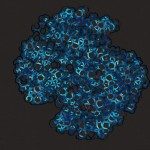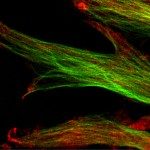Lien vers Pubmed [PMID] – 15049806
Mol. Microbiol. 2004 Apr;52(1):3-11
Protein secretion systems in prokaryotes are increasingly shifting from being considered as experimental models for ‘more complex’ processes (i.e. eukaryotes) to being a major source of key biological questions in their own right. The pathways by which proteins move between compartments or insert into membranes in prokaryotic cells are certainly less numerous than in eukaryotes (though not dramatically so). However, the quality and complexity of bacterial protein targeting systems indicate that virtually all mechanistic problems associated with protein traffic were solved very efficiently well before eukaryotes appeared on the Earth crust. Indeed, recent studies have both increased the number of known prokaryotic protein traffic systems and indicated new layers of complexity for those that were already well characterized. This report describes some recent developments in bacterial protein traffic that were presented at two meetings in the autumn of 2003.

